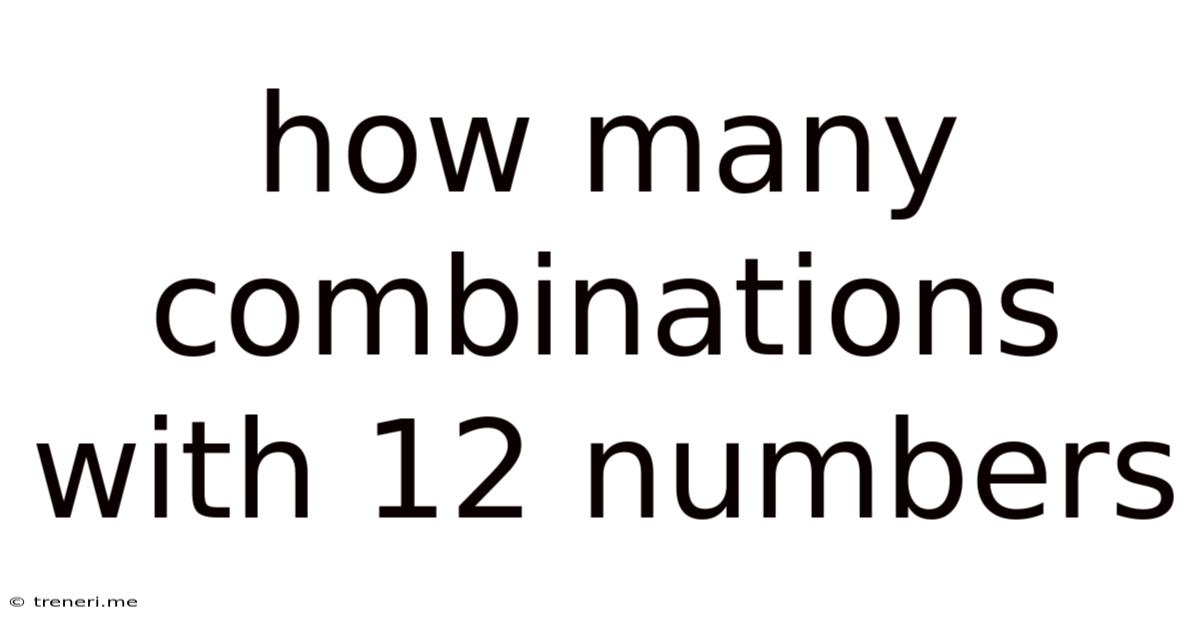How Many Combinations With 12 Numbers
Treneri
May 10, 2025 · 4 min read

Table of Contents
How Many Combinations with 12 Numbers? A Deep Dive into Permutations and Combinations
The question, "How many combinations with 12 numbers?" is deceptively simple. The answer depends entirely on what you mean by "combination." Are you interested in permutations (where order matters), or combinations (where order doesn't matter)? Are you selecting all 12 numbers, or just a subset? This article will explore these nuances, providing a comprehensive understanding of how to calculate the number of combinations and permutations involving 12 numbers, and laying out the fundamental mathematical principles behind these calculations.
Understanding the Basics: Permutations vs. Combinations
Before we delve into the specifics of 12 numbers, let's establish the core concepts:
Permutations: Order Matters
A permutation is an arrangement of objects in a specific order. If we have a set of distinct objects and we want to arrange a certain number of them, the number of permutations is determined by the number of objects available and how many we are selecting. The formula for calculating permutations is:
P(n, r) = n! / (n - r)!
Where:
- n is the total number of objects.
- r is the number of objects we are selecting.
- ! denotes the factorial (e.g., 5! = 5 × 4 × 3 × 2 × 1).
Combinations: Order Doesn't Matter
A combination is a selection of objects where the order doesn't matter. Think of choosing a lottery number; the order in which the numbers are drawn doesn't change the winning combination. The formula for combinations is:
C(n, r) = n! / (r! * (n - r)!)
Where:
- n is the total number of objects.
- r is the number of objects we are selecting.
- ! denotes the factorial.
Combinations with 12 Numbers: Different Scenarios
Now, let's apply these concepts to the scenario of 12 numbers. The number of possibilities explodes dramatically depending on the specific conditions:
Scenario 1: Selecting All 12 Numbers (Permutations)
If you're arranging all 12 numbers, the order matters, and we're dealing with permutations. Let's assume the numbers are distinct (1, 2, 3...12).
Using the permutation formula:
P(12, 12) = 12! / (12 - 12)! = 12! / 0! = 12!
12! = 479,001,600
Therefore, there are 479,001,600 different permutations of 12 distinct numbers.
Scenario 2: Selecting All 12 Numbers (Combinations)
If the order doesn't matter (which is unusual when considering all the numbers), there is only 1 combination. This is because selecting all the numbers results in the same set regardless of the order.
Scenario 3: Selecting a Subset of 12 Numbers (Permutations)
Let's say we have a larger set of numbers, and we are selecting only a subset of 12. For example, selecting 12 numbers from a set of 20. This is again a permutation problem.
Using the permutation formula (assuming we're selecting 12 from 20 distinct numbers):
P(20, 12) = 20! / (20 - 12)! = 20! / 8!
This results in a significantly larger number – approximately 6.70 × 10^11.
Scenario 4: Selecting a Subset of 12 Numbers (Combinations)
This is the most common interpretation of the question. Let's continue with the example of selecting 12 numbers from a set of 20. Here, the order doesn't matter.
Using the combination formula:
C(20, 12) = 20! / (12! * (20 - 12)!) = 20! / (12! * 8!)
This gives us approximately 125,970 combinations.
Expanding the Scope: Non-Distinct Numbers
The calculations above assume all numbers are distinct. However, if some numbers are repeated, the calculations become more complex and require more advanced techniques, often involving multinomial coefficients.
Practical Applications
Understanding combinations and permutations has vast applications across numerous fields:
- Lottery Calculations: Determining the probability of winning a lottery involves calculating combinations.
- Password Security: Estimating the strength of passwords is related to permutation calculations.
- Cryptography: Combinatorics play a crucial role in designing secure cryptographic systems.
- Genetics: In genetics, combinatorics are used to model the inheritance of genes.
- Statistics: Combinatorial analysis is essential in many statistical methods.
- Computer Science: Combinatorics underpins algorithm design and analysis, particularly in areas like sorting and searching.
Beyond the Basics: Advanced Concepts
For larger sets or more complex scenarios involving repeated numbers or restrictions, more advanced combinatorial techniques, such as the inclusion-exclusion principle or generating functions, may be required.
Conclusion
The seemingly simple question of "How many combinations with 12 numbers?" reveals the rich and diverse world of combinatorics. The answer is not a single number but depends critically on whether order matters, the size of the set from which you're selecting, and whether the numbers are distinct. By mastering the fundamentals of permutations and combinations, you can accurately calculate the number of possibilities in various scenarios and apply these skills in diverse fields. Remember to carefully define the problem before attempting a calculation, ensuring you understand whether you need permutations or combinations, and the nature of the numbers involved. With careful consideration and the appropriate formula, you can confidently tackle any combinatorial problem, no matter how intricate it may seem.
Latest Posts
Latest Posts
-
How To Find The Orthocenter Of A Right Triangle
May 10, 2025
-
How To Find Height Of A Equilateral Triangle
May 10, 2025
-
What Is 1 And 1 2 As An Improper Fraction
May 10, 2025
-
Convert Swim Times Yards To Meters
May 10, 2025
-
120 Day Is How Many Months
May 10, 2025
Related Post
Thank you for visiting our website which covers about How Many Combinations With 12 Numbers . We hope the information provided has been useful to you. Feel free to contact us if you have any questions or need further assistance. See you next time and don't miss to bookmark.